1. Early Life and Youth Career
Markus Rosenberg's journey into professional football began at a very young age in his hometown of Malmö, where he quickly demonstrated a natural talent for the sport.
1.1. Early Life and Education
Born in Malmö, Sweden, on 27 September 1982, Nils Markus Rosenberg is the son of Paul, a self-employed salesman, and Marie. He has two younger siblings, Patrick and Linda. His family frequently relocated within the Malmö area during his childhood. Rosenberg attended Geijerskolan for primary school, followed by Munkhätteskolan for fourth and fifth grade, and Tångvallaskolan for sixth through ninth grade. He then pursued his secondary education at Malmö Borgarskola, where he enrolled in a football gymnasium and achieved top honors as the best student.
1.2. Malmö FF Youth System
Rosenberg joined the Malmö FF youth system at the tender age of five, laying the foundation for his long and impactful association with the club. Initially, he played as a right-back within the youth team, where he found considerable success. At the age of 16, he transitioned to playing as a striker, a move that proved pivotal for his career. By the 2000 season, Rosenberg was making a significant impact for the club's reserve side, scoring 26 goals, which earned him a promotion to the first team. During his time in the Malmö FF youth system, he was affectionately nicknamed "Sillen" (meaning "Herring"), a reference to his small stature and quick wit.
2. Club Career
Rosenberg's club career spanned over two decades, featuring periods of significant success and personal development across various European leagues.
2.1. Malmö FF (First Stint)
Rosenberg began his professional playing career with his boyhood club, Malmö FF, making his league debut on 10 May 2001, as a 78th-minute substitute in a 2-0 victory against AIK. He earned his first start on 26 May 2001 in a 1-0 win over Hammarby. His first goal for Malmö FF came on 2 July 2001 in a 2-0 win against GIF Sundsvall. However, he initially faced stiff competition for a regular first-team spot from established strikers like Niklas Skoog and Peter Ijeh, which, coupled with his own injury concerns, often relegated him to the substitute bench. Despite these challenges, Rosenberg signed a three-year contract extension with the club in August 2001. By the end of the 2001 season, he had made 15 appearances, scoring once.
The 2002 season continued to see limited first-team opportunities for Rosenberg due to strong competition and recurring injury problems. He frequently played for the reserve side, though he did make a number of starts towards the end of the season. He concluded the 2002 season with 13 appearances across all competitions.
The 2003 season saw a promising start for Rosenberg, as he scored in the opening match, a 2-0 win against Örebro SK. He added a second league goal on 5 May 2003 in a 2-1 loss to Hammarby. In the third round of the 2003 Svenska Cupen against IFK Luleå on 29 May 2003, Rosenberg scored a brace in a dominant 4-0 victory. Three months later, on 17 August 2003, he found the net again in a resounding 6-0 win against Hammarby. Despite these contributions, he largely remained a backup option, overshadowed by Skoog, Ijeh, and Andreas Yngvesson, though he often received playing time when Skoog was absent. Rosenberg made his European debut in the UEFA Cup first round, coming on as a 62nd-minute substitute in a 1-0 loss to Sporting CP on 15 October 2003. By the end of the 2003 season, he had made 21 appearances and scored five goals in all competitions. Following this, he renewed his contract for another three years, securing his stay until 2006.
2.2. Loan to Halmstads BK
With the acquisition of strikers Afonso Alves and Igor Sypniewski by Malmö FF prior to the 2004 season, Rosenberg opted for a loan move to Halmstads BK to secure more playing time.
He made an immediate impact on his Halmstads debut, scoring the club's third goal in a 5-2 victory against Örebro in the season opener. He quickly established himself as a starting striker for the team. On 25 April 2004, Rosenberg scored his second goal for the club in a 3-2 win against Helsingborgs IF. Over the next five months, he added three more goals before netting a brace against his parent club, Malmö FF, in a 2-2 draw on 14 September 2004. By the end of September, Rosenberg was in prolific form, scoring five more goals, including a brace against Trelleborgs FF and a hat-trick against Örebro. In October 2004, he scored twice in a 2-1 win against Helsingborgs. His loan spell at Halmstads BK was highly successful, as he became the top goalscorer of the 2004 Allsvenskan season with 14 goals. Halmstads BK narrowly missed out on the league title, finishing just two points behind Malmö FF. Rosenberg concluded the 2004 season with 29 appearances and 17 goals in all competitions.
Upon the conclusion of his loan spell, Rosenberg returned to Malmö FF for the start of the 2005 season. He immediately rejoined the starting lineup, playing the full 90 minutes in a 2-1 loss to IFK Göteborg in the season's opening match. In the subsequent game against Landskrona BoIS, he scored his first goal of the season in a 1-0 victory. On 19 May 2005, he scored his second goal of the season in a 3-1 win over Landskrona BoIS in the Svenska Cupen. Between 16 June and 27 June 2005, Rosenberg scored three goals in as many consecutive matches. He successfully retained his first-team position and formed an effective partnership with Afonso Alves. Before his departure to Ajax, Rosenberg also topped the scoring charts in the inaugural 2004-05 Royal League and led the Allsvenskan in assists. By the time he left Malmö FF, he had made 13 appearances and scored five goals in all competitions.
2.3. Ajax
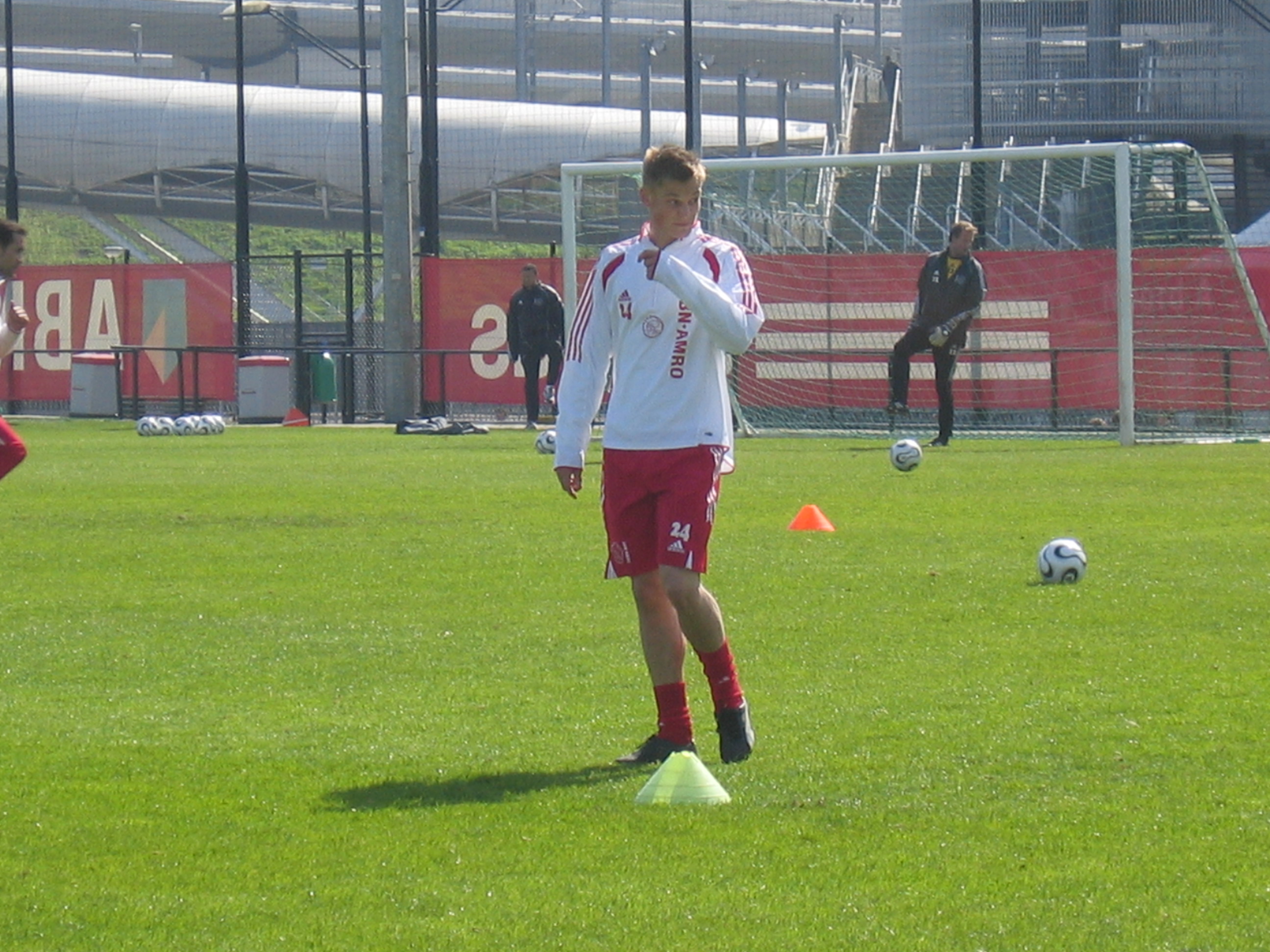
Rosenberg transferred to Dutch Eredivisie side Ajax at the beginning of the 2005-06 season for a transfer fee of 5.30 M EUR. He had previously declined a lucrative multi-million euro offer from Russian club FC Lokomotiv Moscow, stating his preference for a country and league where he felt a better fit, rather than prioritizing financial gain.
Manager Danny Blind immediately integrated Rosenberg into the starting eleven, showing confidence in his abilities. Rosenberg quickly made his mark, scoring on his debut in a 2-2 draw against Brøndby IF in the first leg of the UEFA Champions League qualifying round. In the return leg, he helped Ajax secure a 3-2 victory to advance to the group stage. He also scored on his Eredivisie debut and assisted the club's first goal in a 2-0 win against RBC Roosendaal in the season opener. On his 23rd birthday, 27 September 2005, Rosenberg scored against Arsenal in a 2-1 loss in the 2005-06 UEFA Champions League. As the 2005-06 season progressed, his performance levels declined, leading Blind to switch from a 4-3-3 system with Rosenberg as a sole central striker to a 4-4-2 system, pairing Rosenberg with Angelos Charisteas. Despite the formation change, Ajax continued to underperform. During the winter break, Klaas-Jan Huntelaar joined the club for a transfer fee of 9.00 M EUR. Consequently, Rosenberg was shifted from central forward to the left wing as the club reverted to a 4-3-3 formation. Despite this change, he managed to score five consecutive goals between 15 January and 8 February 2006. A week later, on 19 February 2006, he scored twice in a 6-0 win against RBC Roosendaal. With the adjusted lineup, Ajax's performance improved in the latter half of the season, allowing them to secure a fifth-place finish in the regular competition and qualify for the newly introduced Eredivisie play-offs. In the play-offs, they defeated Feyenoord and FC Groningen to secure a spot in the Champions League preliminaries for the following season. Ajax also won the KNVB Cup that season. By the end of the 2005-06 season, Rosenberg had made 48 appearances, scoring 15 goals in all competitions.
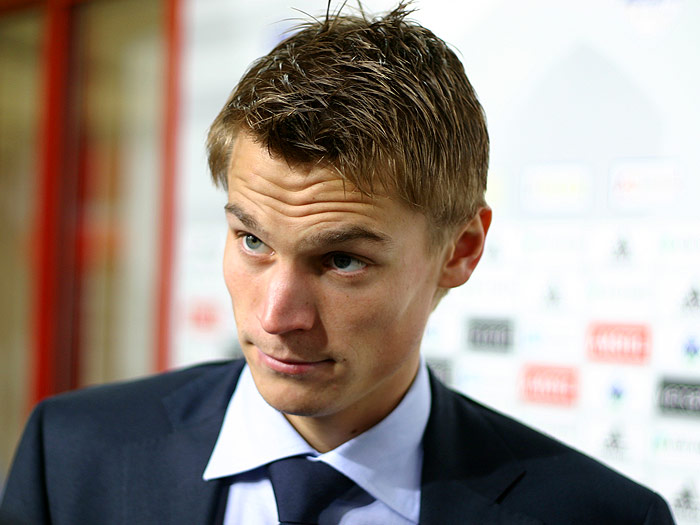
At the start of the 2006-07 season, Rosenberg played the full match as Ajax defeated PSV Eindhoven 3-1 to win the 2006 Johan Cruyff Shield. However, he no longer held a regular first-team position, primarily serving as a backup to Klaas-Jan Huntelaar. He scored three goals in two UEFA Cup appearances against IK Start. Despite his contributions, he could not displace Huntelaar as the main striker under new coach Henk ten Cate. By the time Rosenberg departed from Ajax, he had made 14 appearances and scored three goals in all competitions.
2.4. Werder Bremen
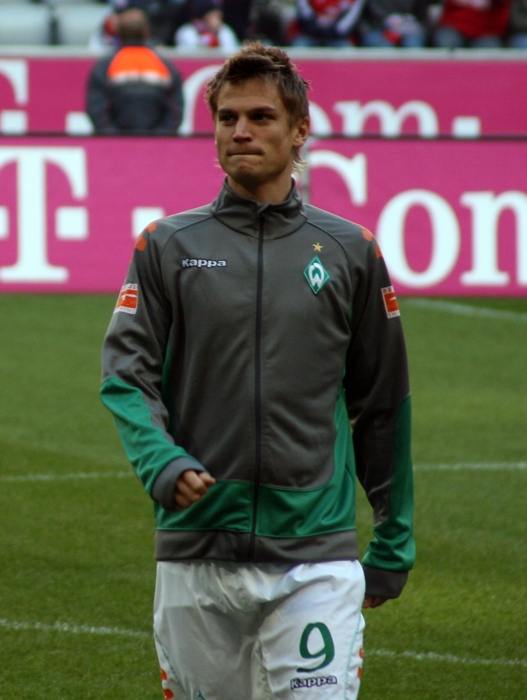
After being linked with a move away from Ajax, it was announced on 26 January 2007 that Rosenberg had transferred to Bundesliga club Werder Bremen on a four-year contract, keeping him at the club until 2011, for an undisclosed fee (reported to be around 4.50 M EUR). Upon joining, he was assigned the number nine shirt.
Two days after signing for Werder Bremen, Rosenberg made his debut, coming on as an 83rd-minute substitute in a 2-0 win against Hannover 96. On 11 March 2007, he scored his first goal for the club with a back-of-the-head flick in a 1-1 draw against Bayern Munich. After adding two more goals in April during Bremen's pursuit of the Bundesliga title, Rosenberg scored his first hat-trick for the club in a 4-1 victory over Hertha BSC on 6 May 2007. Despite setting up Bremen's only goal in a 2-1 loss to Eintracht Frankfurt on 12 May 2007, the defeat effectively ended Werder Bremen's title hopes. In the final game of the season, he scored twice in a 2-0 win over VfL Wolfsburg on 19 May 2007. By the end of the 2006-07 season, Rosenberg had scored eight goals in 14 appearances (five of them as a substitute), making him the most effective substitute in the league.
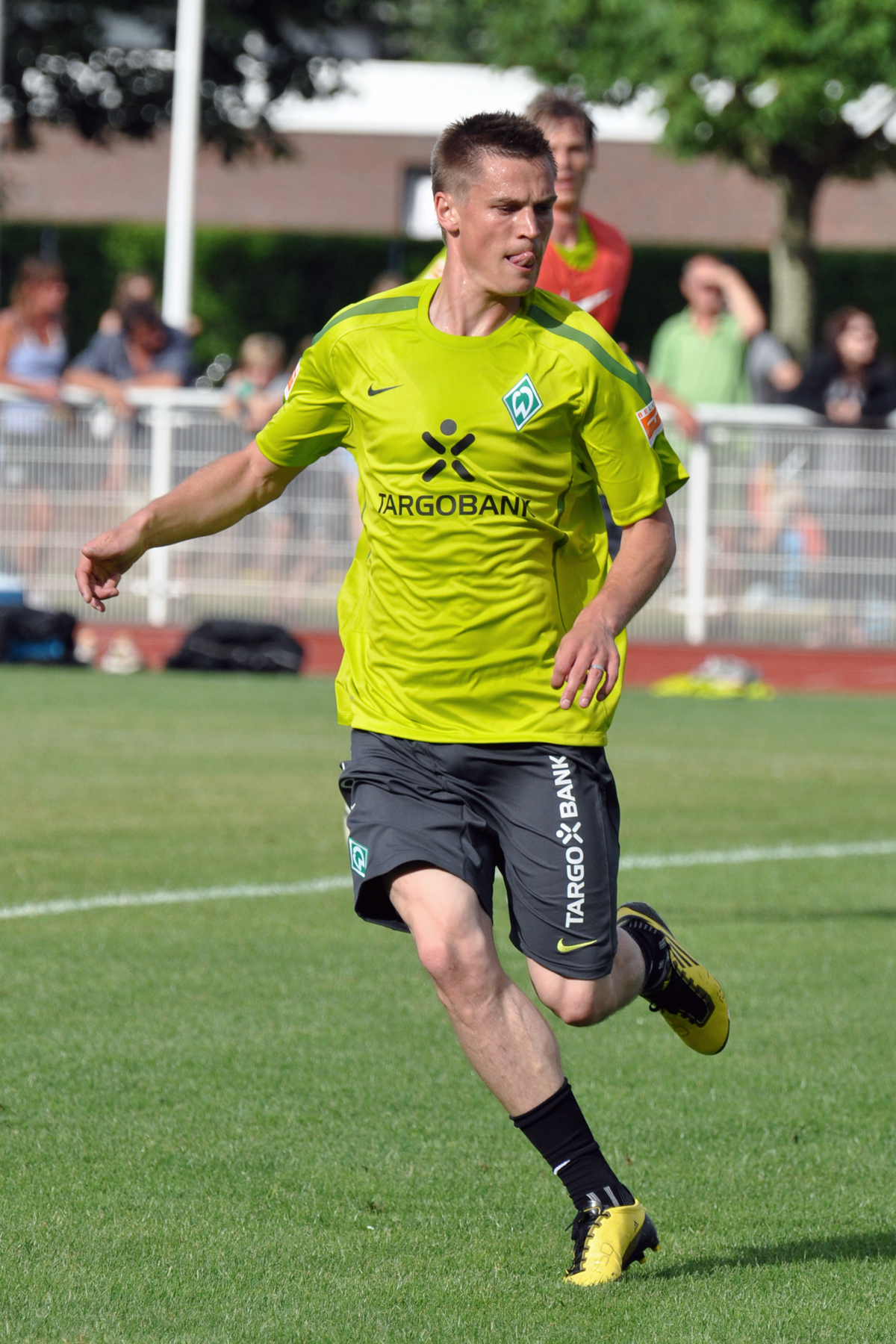
At the start of the 2007-08 season, Rosenberg's goal-scoring form dipped, drawing criticism from manager Thomas Schaaf regarding his pre-season performances. Nevertheless, he managed to regain a place in the first team, moving in and out of the starting lineup. On 29 September 2007, he scored his first goal of the season and assisted another in an emphatic 8-1 win against Arminia Bielefeld. After scoring two more goals in October, Rosenberg opened the scoring and assisted a goal for Boubacar Sanogo in a crucial 3-2 Champions League group stage victory over Real Madrid on 28 November 2007. He then scored three goals in two matches between 8 December and 15 December 2007, including a brace against Hannover 96. In the latter half of the 2007-08 season, he added five more goals, including a brace against Borussia Dortmund, contributing significantly to Werder Bremen's qualification for the next Champions League season. By the end of the 2007-08 season, Rosenberg had made 42 appearances and scored 16 goals in all competitions, making him Bremen's top league goal scorer with 14 goals, ahead of Diego.
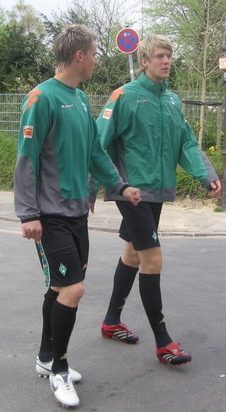
Rosenberg started the 2008-09 season strongly, scoring four goals and assisting Hugo Almeida twice in a dominant 9-3 win over Eintracht Nordhorn in the first round of the DFB-Pokal on 9 August 2008. Seven days later, he scored a brace on his league debut of the season in a 2-2 draw against Arminia Bielefeld. On 20 September 2008, he scored twice in a remarkable 5-2 victory over Bayern Munich, marking Bremen's first-ever win at the Allianz Arena. This was followed by his ninth goal of the season in a 2-1 win against Erzgebirge Aue in the second round of the DFB-Pokal. Despite the arrival of Claudio Pizarro, Rosenberg remained an integral part of the first team. After a muscular injury sustained on international duty, he added two more goals by the end of 2008, scoring against Hertha BSC and Inter Milan (though Bremen were eliminated from the Champions League group stage and demoted to the UEFA Cup). On 15 March 2009, Rosenberg scored twice in a 4-0 win over VfB Stuttgart, ending a ten-match goal drought. Although sidelined later in the season due to injury, he started in the 2009 UEFA Cup Final against Shakhtar Donetsk, playing 78 minutes in a 2-1 extra-time loss. However, Werder Bremen did win the DFB-Pokal, beating Bayer Leverkusen 1-0. By the end of the 2008-09 season, he had made 47 appearances, scoring 13 goals in all competitions, making him the club's third-highest goal scorer. Despite this, his goal-scoring form faced criticism compared to his first two seasons.
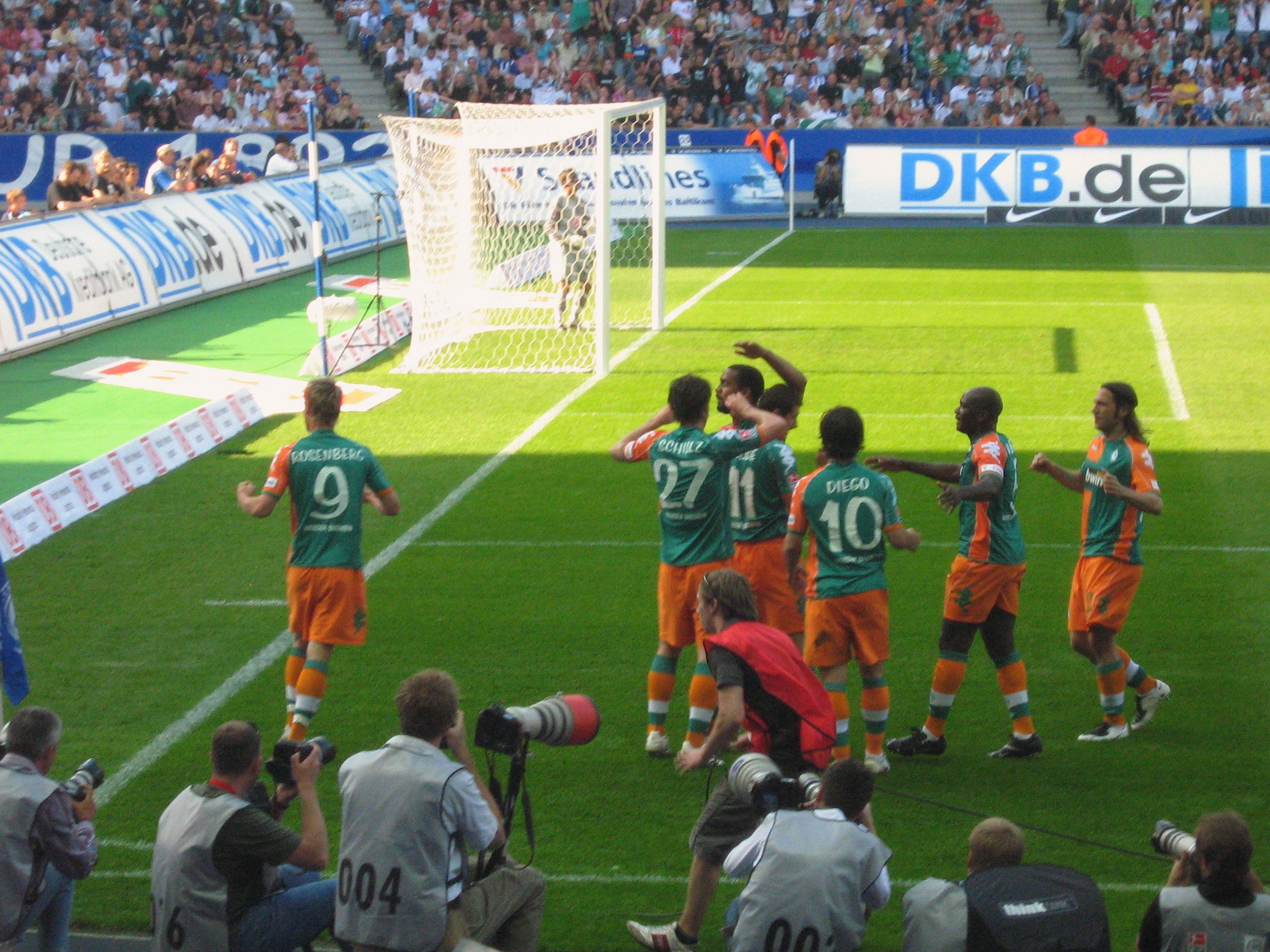
Ahead of the 2009-10 season, Rosenberg suffered a knee injury that sidelined him for three months. He made his first appearance of the season on 20 September 2009, as a 68th-minute substitute in a 0-0 draw against Bayer Leverkusen. Due to strong competition for striker positions, Rosenberg was often relegated to the substitutes' bench. Despite limited playing time, he scored his first and only league goal of the season in a 6-0 win over SC Freiburg on 21 November 2009. He managed three goals in the 2009-10 UEFA Europa League, including a brace in a 4-1 win over Nacional and another goal in a 3-1 win over Athletic Bilbao. Following a poor Bundesliga performance against VfL Bochum, Rosenberg was controversially omitted from the squad for the DFB-Pokal semi-final against FC Augsburg. He publicly expressed his frustration, stating he was not there "to sit in the stands." By the end of the 2009-10 season, Rosenberg had made 24 appearances, scoring four times in all competitions.
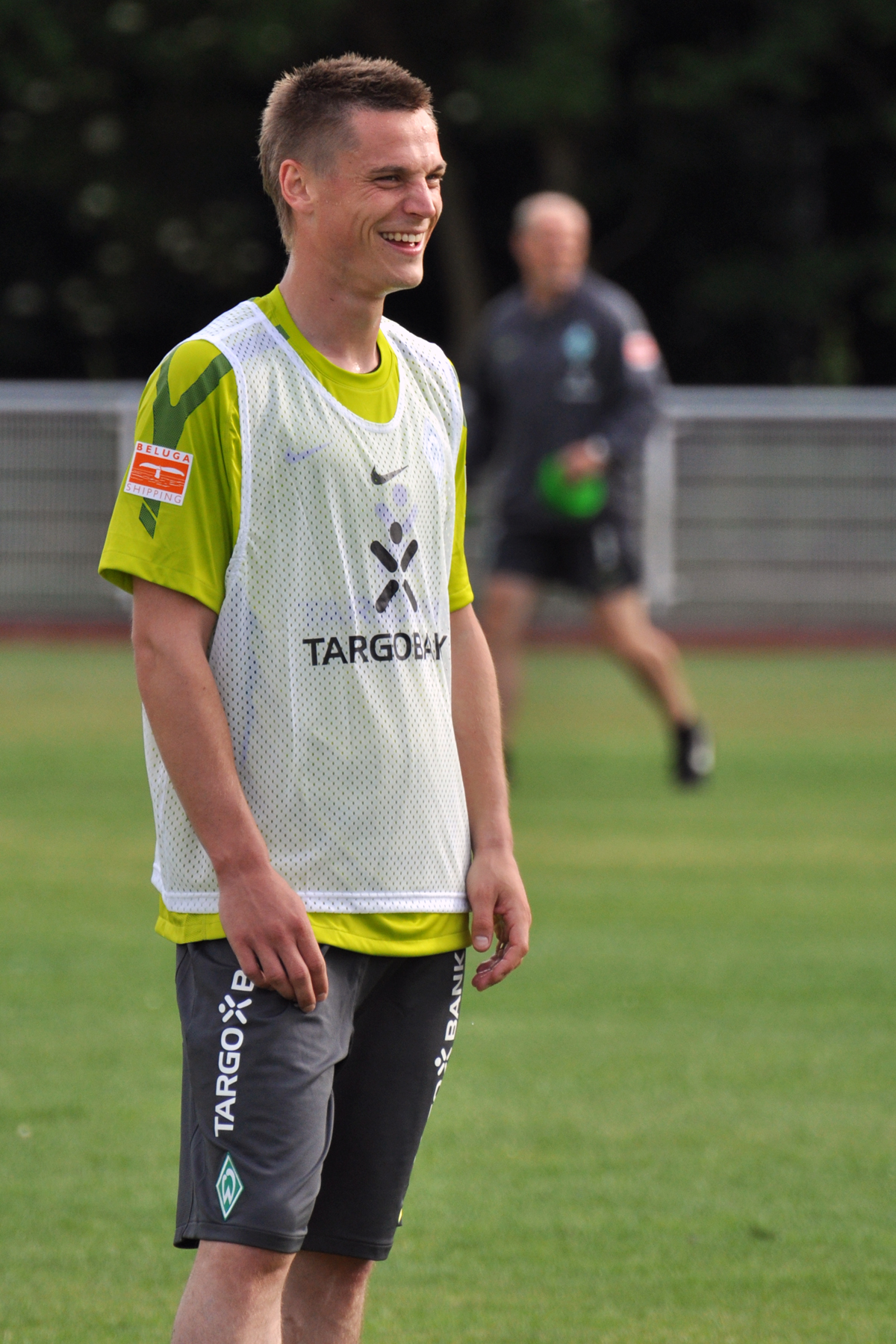
Prior to the 2010-11 season, Rosenberg affirmed his desire to remain with Bremen despite contract negotiation issues. In the second leg of the 2010-11 UEFA Champions League play-off round against Sampdoria on 24 August 2010, with Bremen trailing 0-3, Rosenberg scored a crucial injury-time goal, forcing extra time, before Claudio Pizarro secured the decisive goal for Champions League group stage qualification. This proved to be his only appearance of the 2010-11 season. On 31 August 2010, he signed a one-year contract extension.
2.4.1. Loan to Racing Santander
On the same day he extended his contract with Werder Bremen, Rosenberg was loaned out to Spanish La Liga club Racing Santander for the remainder of the 2010-11 season. Upon joining, Rosenberg expressed his long-held dream of playing in Spain.
Rosenberg made his debut for Santander on 11 September 2010 in a 1-0 defeat to Valencia. Despite a minor knee injury, he quickly recovered and came on as a substitute in a 2-0 win against Real Zaragoza on 19 September 2010. However, in the subsequent match against Getafe, Rosenberg received two yellow cards and was sent off, resulting in a one-match ban. He returned to the starting lineup on 17 October 2010, helping the team secure a 1-0 win against UD Almería. Rosenberg then scored his first goal for Santander in a 6-1 defeat to Real Madrid. He followed this with a brace in a 4-1 victory over CA Osasuna. Having quickly become a regular first-team striker, he scored two more goals in matches against Deportivo de La Coruña and Málaga between 28 November and 5 December 2010. After serving a two-match suspension, Rosenberg returned as a 60th-minute substitute in a 1-0 win against Getafe on 20 February 2011. He scored his fifth goal for the club in a 3-1 loss against CA Osasuna on 13 March 2011. A knee injury sustained in training sidelined him for two weeks, but he returned on 17 April 2011. Rosenberg then scored two goals in the next two matches against Málaga and RCD Mallorca. He scored his ninth goal for the club in a 2-1 win against Atlético Madrid on 10 May 2011. By the end of the season, Rosenberg led Racing Santander in scoring with nine goals in 35 appearances across all competitions. In June 2011, he publicly stated his desire to continue playing in Europe for a few more years before concluding his career at Malmö FF.
Ahead of the 2011-12 season, Rosenberg returned to Werder Bremen following his loan spell. He started the season well, scoring the club's first goal in a 2-1 loss to 1. FC Heidenheim in the first round of the DFB-Pokal. This was followed by a brace in a 2-0 win over 1. FC Kaiserslautern on the opening day of the 2011-12 Bundesliga season. Three weeks later, on 27 August 2011, Rosenberg scored his second goal of the season in a 2-1 win against 1899 Hoffenheim. He successfully regained his first-team place as a striker. He scored two goals in matches against Bayern Munich and VfL Wolfsburg in December 2011. After a three-month goal drought, he scored his sixth goal of the season in a 3-0 win against Hannover 96 on 11 March 2012. The following month, Rosenberg scored four more goals for the team. By the end of the 2011-12 season, he had made 34 appearances and scored 11 goals in all competitions. On 3 May 2012, Werder Bremen announced they would not extend Rosenberg's contract. Due to his aerial ability and strength, Rosenberg was regarded as a dangerous header, but also effective with the ball at his feet. He became a fan favorite, earning the nickname "Rosi". Although he sometimes struggled in the league, he proved to be a highly efficient goal scorer in European and domestic cup competitions, forming strong partnerships with fellow strikers like Hugo Almeida and Boubacar Sanogo.
2.5. West Bromwich Albion
On 7 August 2012, Premier League club West Bromwich Albion announced they had signed Rosenberg on a three-year contract. He was assigned the number 8 shirt for the 2012-13 season.
Rosenberg made his West Bromwich Albion debut as a 78th-minute substitute in a 1-1 draw against Tottenham Hotspur on 25 August 2012. Four days later, on 29 August 2012, he made his first start for the team in a 4-2 win against Yeovil Town. However, Rosenberg found first-team opportunities limited due to strong competition in the striker position, primarily appearing as a substitute. Despite struggling to score, he provided two assists, one against Wigan Athletic on 4 May 2013 and another against Manchester United on 19 May 2013. By the end of the 2012-13 season, Rosenberg had played 24 Premier League matches but failed to score any goals.
Ahead of the 2013-14 season, Rosenberg remained at West Bromwich Albion despite being informed he could leave the club. Amid transfer speculation, he made his first appearance of the season as an 83rd-minute substitute in a 1-0 loss to Southampton in the opening game. However, he continued to face limited first-team opportunities. In October 2013, Rosenberg publicly stated his desire to leave West Bromwich Albion. Having made only four league appearances, Rosenberg and the club reached a mutual agreement to terminate his contract on 1 February 2014. Upon his departure, Rosenberg generously donated all the contents of his house to charity.
2.6. Return to Malmö FF
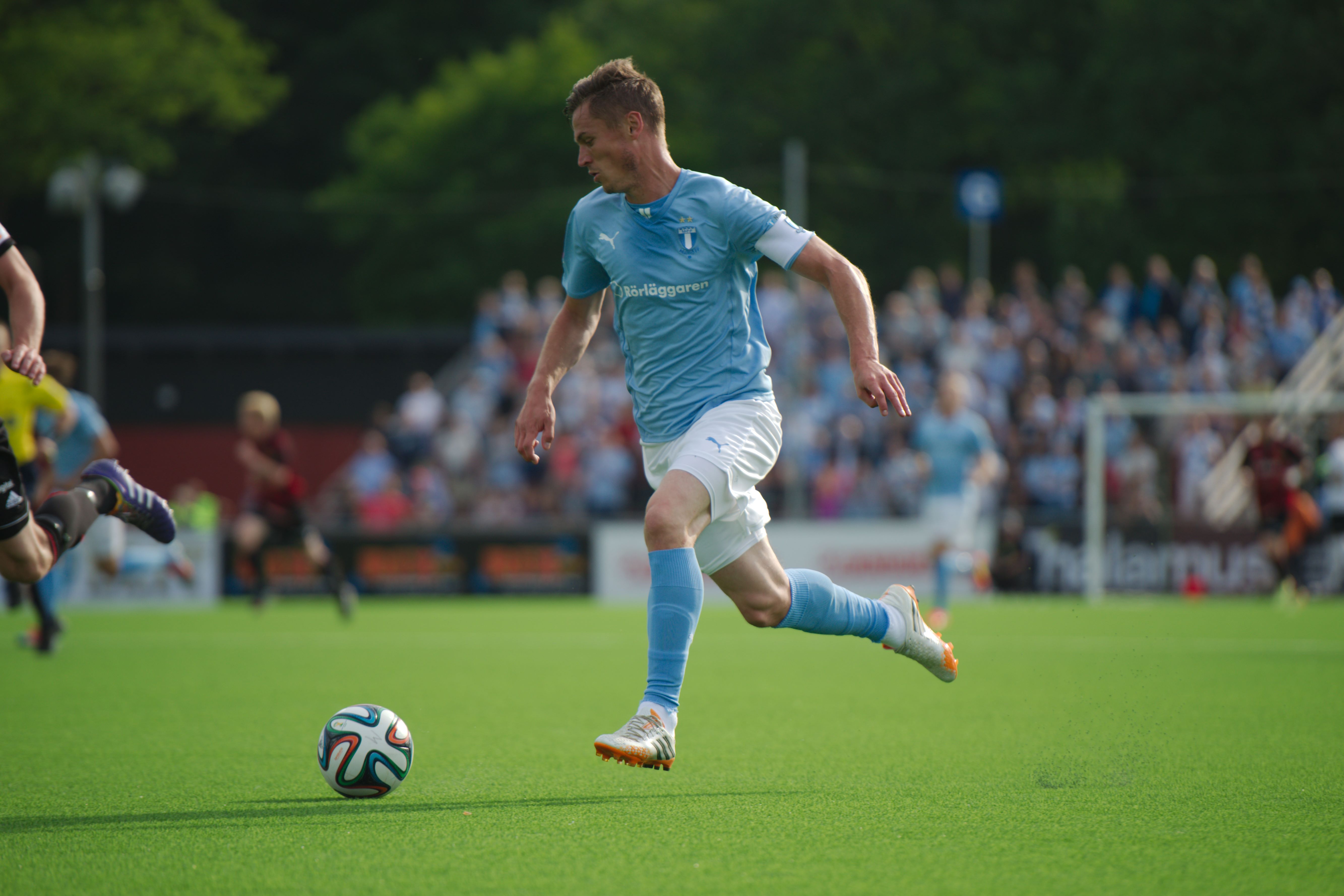
On 1 February 2014, Malmö FF confirmed an agreement for a three-year contract with Rosenberg, marking his return to the club after a nine-year absence. The transfer was officially confirmed on 3 February 2014 after he successfully completed his medical examination. Rosenberg then joined the club's pre-season training camp in Bradenton, Florida.
2.6.1. 2014 Season
Rosenberg's first appearance after returning to Malmö FF was in a Svenska Cupen match against Degerfors, where he assisted a goal before being substituted in the 13th minute due to injury, in a 7-1 victory. After missing one match, he returned for a Svenska Cupen game against Hammarby, scoring and assisting the club's third goal in a 3-2 win. His first league goal since returning came on 7 April 2014, in a 3-0 away victory against rivals IFK Göteborg. This was followed by a goal in a 1-0 win against Gefle. Following an injury to captain Guillermo Molins, Rosenberg captained the side for the first time on 22 May 2014, helping Malmö FF secure a 1-0 win against Mjällby. On 1 July 2014, it was announced that Rosenberg would assume the captaincy for the remainder of the season. Shortly after, on 6 July 2014, he scored Malmö's only goal in a 1-1 draw against Brommapojkarna.
Rosenberg embarked on a scoring spree between 26 July and 13 August 2014, finding the net against Kalmar, Falkenberg, Sparta Prague (twice), IFK Göteborg, and Örebro (twice). During this period, Rosenberg announced his retirement from the Swedish national team to fully concentrate on his club career, having re-established himself as a first-team regular at Malmö FF. The following day, he scored a brace as Malmö FF defeated Red Bull Salzburg 3-0 in the Champions League play-off round, securing qualification for the 2014-15 UEFA Champions League group stage. Rosenberg continued his prolific form, scoring against Mjällby, Olympiacos (securing Malmö's first win in the 2014-15 UEFA Champions League group stage), AIK, Elfsborg, and Brommapojkarna. He scored his final UEFA Champions League goal of the season in a 4-2 loss against Olympiacos on matchday 6. Overall, Rosenberg scored 15 goals and provided 14 assists in the league, playing a vital role in the team successfully defending their league title. This marked the first time in his career that he won a league title. With 15 league goals and 24 goals across all competitions, 2014 became Rosenberg's most successful season to date in terms of goals scored. His outstanding performance earned him the Allsvenskan Forward of the Year and Allsvenskan Most Valuable Player of the Year awards. He was also nominated for Swedish Forward of the Year at the Fotbollsgalan.
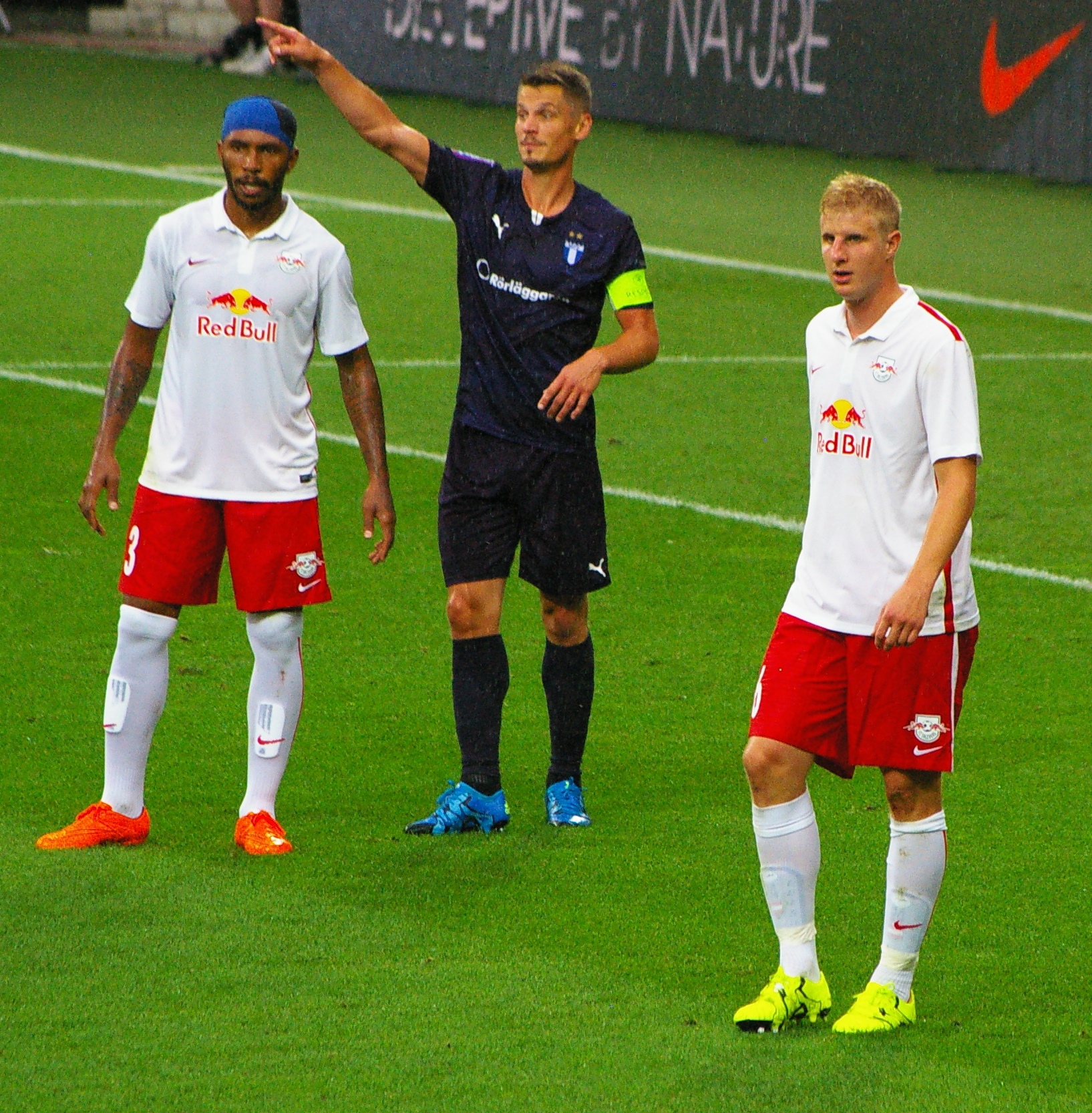
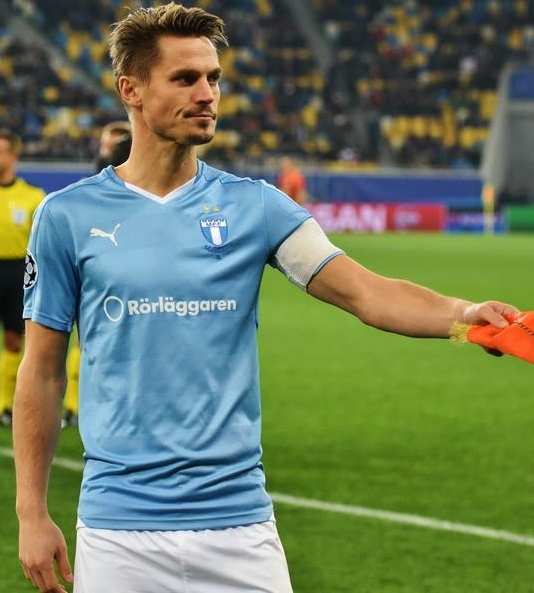
2.6.2. 2015 Season
Before the 2015 season, Markus Rosenberg was announced as the new permanent captain for Malmö FF, succeeding Guillermo Molins. He started the season strongly, scoring two goals in four Svenska Cupen matches. In the opening league game, a 4-1 win against GIF Sundsvall, he scored and assisted Malmö's second goal. Earlier in the season, Rosenberg had been linked with a move away from Malmö FF, but he put an end to transfer rumors by signing a contract extension with the club, keeping him until 2017, notably rejecting a multi-million offer from Saudi Arabia. From the start of the 2015 season, Rosenberg maintained his first-team place and captaincy. He scored two goals over the next three months, against Hammarby on 20 April 2015 and Åtvidaberg on 31 May 2015.
Between mid-July and August, Rosenberg experienced a prolific scoring period, adding eight goals to his tally. One of these crucial goals came in Malmö's 3-0 return leg win over Red Bull Salzburg in the third qualifying round for the 2015-16 UEFA Champions League on 5 August 2015. This aggregate 3-2 victory saw Malmö eliminate Salzburg for the second consecutive season, contributing to Salzburg's ongoing failure to qualify for the Champions League since being acquired by Red Bull in 2005. In their home match on 25 August 2015, Rosenberg scored the opening goal as Malmö defeated Celtic 2-0, winning 4-3 on aggregate and thus qualifying for the Champions League group stage for the second year in a row. He later scored four more goals in the 2015 season, including a brace against Kalmar FF on 17 October 2015. After serving a one-match suspension, Rosenberg returned to the starting lineup for the final game of the season against IFK Norrköping, but was sent off in the 5th minute in a match Malmö lost 2-0. Malmö FF, unfortunately, could not replicate their European success domestically, finishing in a disappointing fifth place in the league. Despite three periods of absence from the first team during the season, Rosenberg concluded the 2015 season with 42 appearances and 16 goals across all competitions.
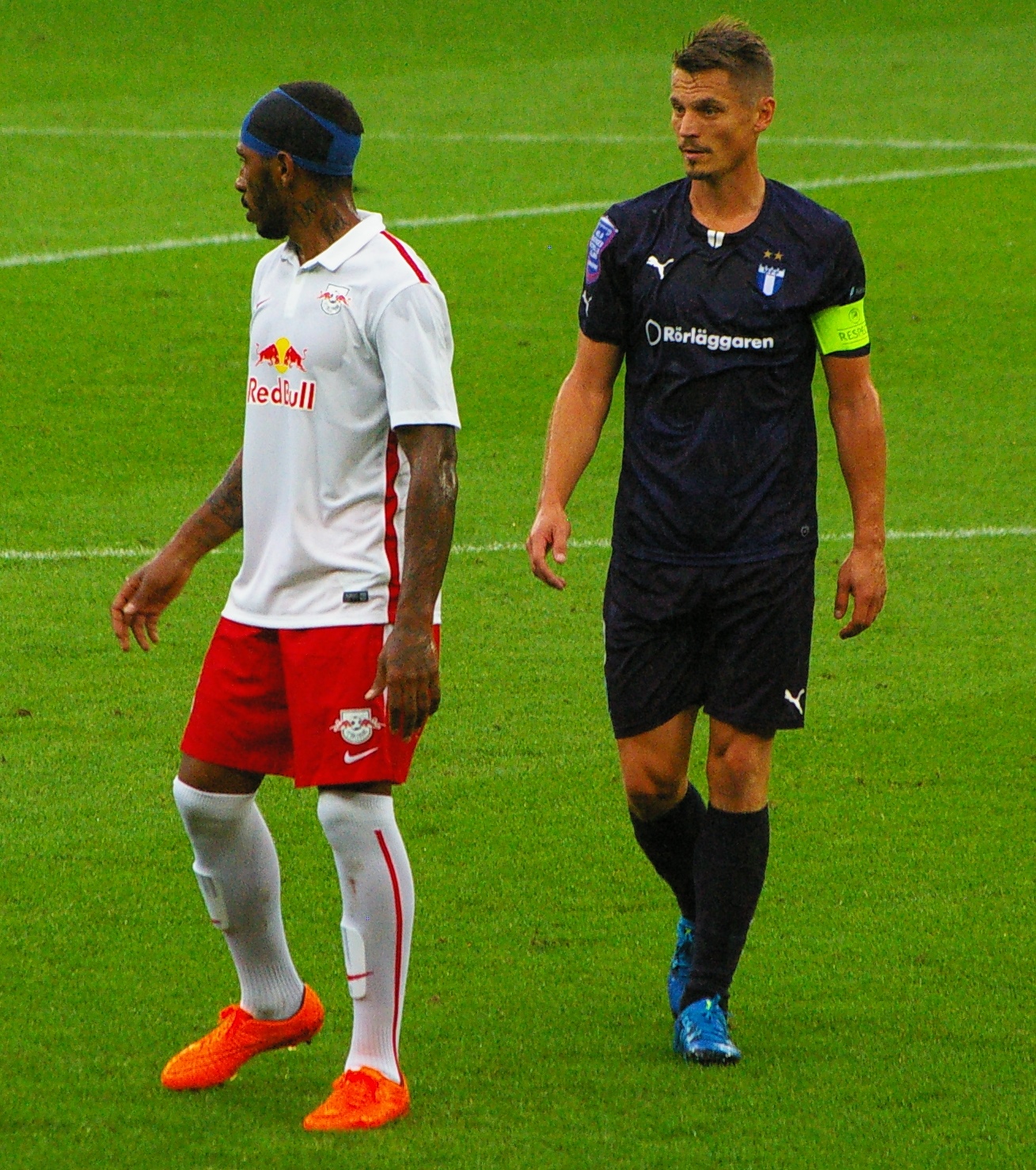
2.6.3. 2016 Season
At the beginning of the 2016 season, Rosenberg maintained his status as a first-team player and continued his role as captain. He opened his scoring account for the season with two goals in a 3-2 victory over Kalmar in the Svenska Cupen semi-finals, which sent Malmö FF to the final. Rosenberg then scored the club's only goal in a 1-0 win against Elfsborg on 18 April 2016. After missing one match due to a thigh injury, he returned to the first team in a game against BK Häcken on 1 May 2016, coming on as a 70th-minute substitute, but was sent off in the final minutes for an unprofessional foul. While serving a two-match league suspension, Rosenberg started in the 2016 Svenska Cupen Final against BK Häcken, scoring the opening goal before being substituted in the 64th minute. Malmö FF eventually lost the final 6-5 in a penalty shoot-out after a 2-2 draw.
Following his suspension, he returned to the first team on 18 May 2016, coming on as a second-half substitute in a 3-2 win against Hammarby. Rosenberg continued his scoring form, netting goals in the subsequent two matches against Falkenbergs and Östersund. On 1 August 2016, he scored his seventh goal of the season in a 3-0 win against Örebro. A month later, on 12 September 2016, Rosenberg scored twice in Malmö FF's 3-1 victory over IFK Göteborg. However, during a 2-0 win against Helsingborgs on 25 September 2016, he suffered a groin injury and was substituted in the 39th minute, which sidelined him for a month. Despite Rosenberg's absence, the club rebounded, and he secured his second league title with Malmö FF after a 3-0 win over Falkenbergs on 26 October 2016. In the final game of the season against Hammarby, he returned from injury as a 71st-minute substitute in a 3-0 win. By the end of the 2016 season, Rosenberg had made 28 appearances and scored 11 goals across all competitions.
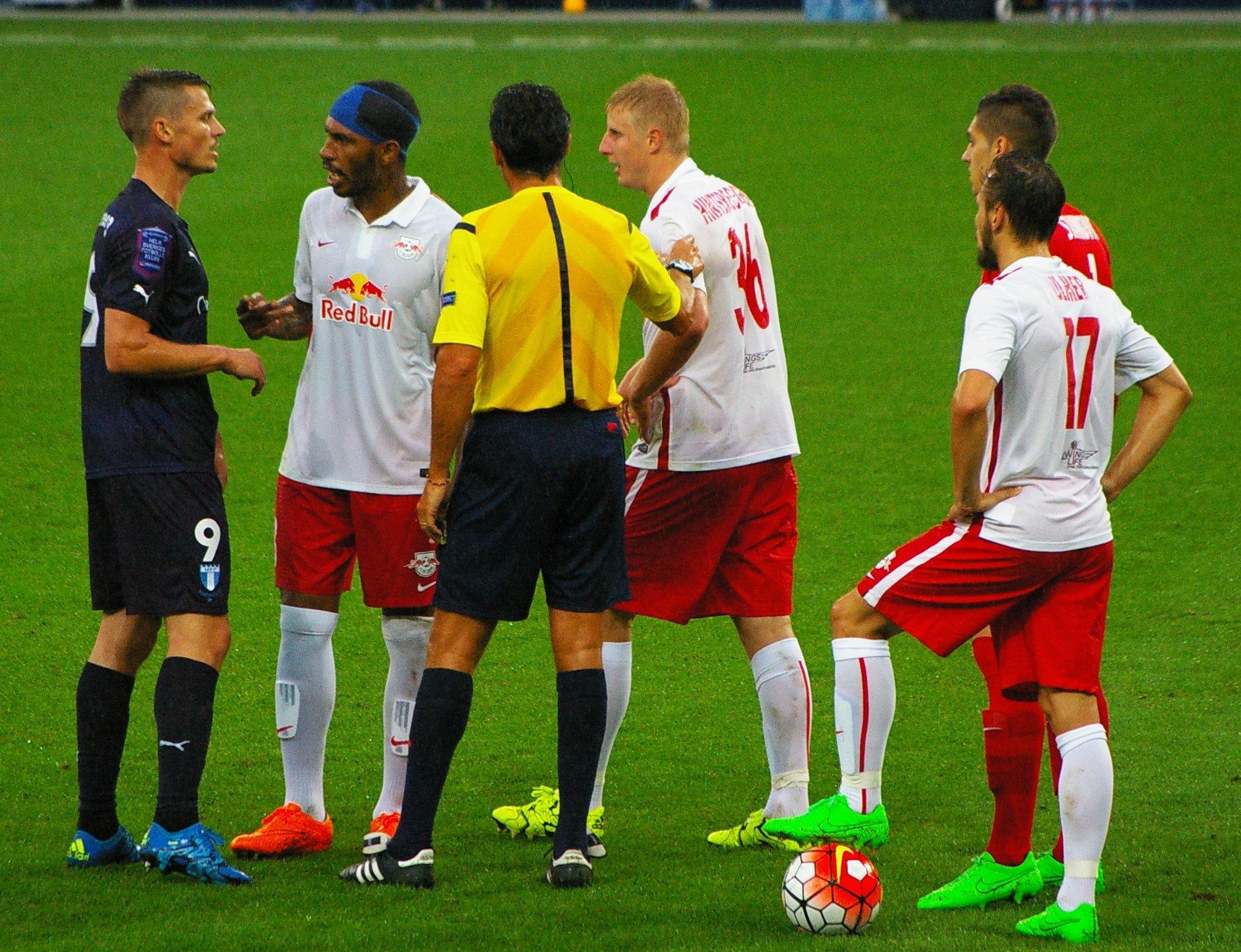
2.6.4. 2017 Season
At the beginning of the 2017 season, Rosenberg retained his first-team place and continued as captain. He scored his first goal of the season on 11 April 2017, contributing to a 2-0 win against GIF Sundsvall. Rosenberg then scored three more goals throughout May. However, during a 3-2 victory against AFC Eskilstuna on 1 July 2017, he suffered an injury and was substituted in the 10th minute, resulting in a three-week layoff. On 17 July 2017, he returned to the starting lineup for the second leg of the UEFA Champions League second round against FK Vardar, scoring Malmö's only goal in a 3-1 loss, which led to their elimination from the tournament. On 7 August 2017, during a 1-0 win against Djurgården, Rosenberg received a straight red card in the 86th minute for an unprofessional foul. After serving a two-match suspension, he scored his sixth goal of the season in a 2-2 draw against IFK Göteborg on 27 August 2017. Following this, it was announced that Rosenberg had signed a one-year contract extension with the club. After serving another suspension, Rosenberg returned to the starting lineup and scored in consecutive matches against Elfsborg and Halmstads. In a subsequent win against IFK Norrköping, he helped the team secure the league title with Malmö FF three matchdays before the end of the season. Rosenberg concluded the 2017 season with 25 appearances and 8 goals across all competitions.
2.6.5. 2018 Season
Markus Rosenberg maintained his role as a first-team player and captain for the 2018 season. He began the season by scoring his first goal in a 1-0 Svenska Cupen win against Dalkurd on 18 February 2018. Two weeks later, on 6 March 2018, Rosenberg reached a significant milestone in his Malmö FF career, scoring twice in a 2-2 friendly draw against FC Nordsjælland to bring his total goals for the club to 101. He then scored three more goals throughout April, including a brace against Brommapojkarna on 23 April 2018. In the 2018 Svenska Cupen Final against Djurgården, he captained the team, but they suffered a 3-0 defeat. His goal-scoring run continued throughout July, with five goals despite missing one match due to suspension. He played a crucial role in helping Malmö FF advance past the 2018-19 UEFA Europa League group stage, scoring in both legs of a 4-2 aggregate win against FC Midtjylland. Rosenberg added four more goals in the following two months and scored two goals in the final two league matches of the season against IFK Göteborg and Elfsborg. By the end of the 2018 season, Rosenberg had made 46 appearances and scored 19 goals across all competitions. On 9 November 2018, he signed another one-year contract extension with Malmö FF.
2.6.6. 2019 Season and Retirement
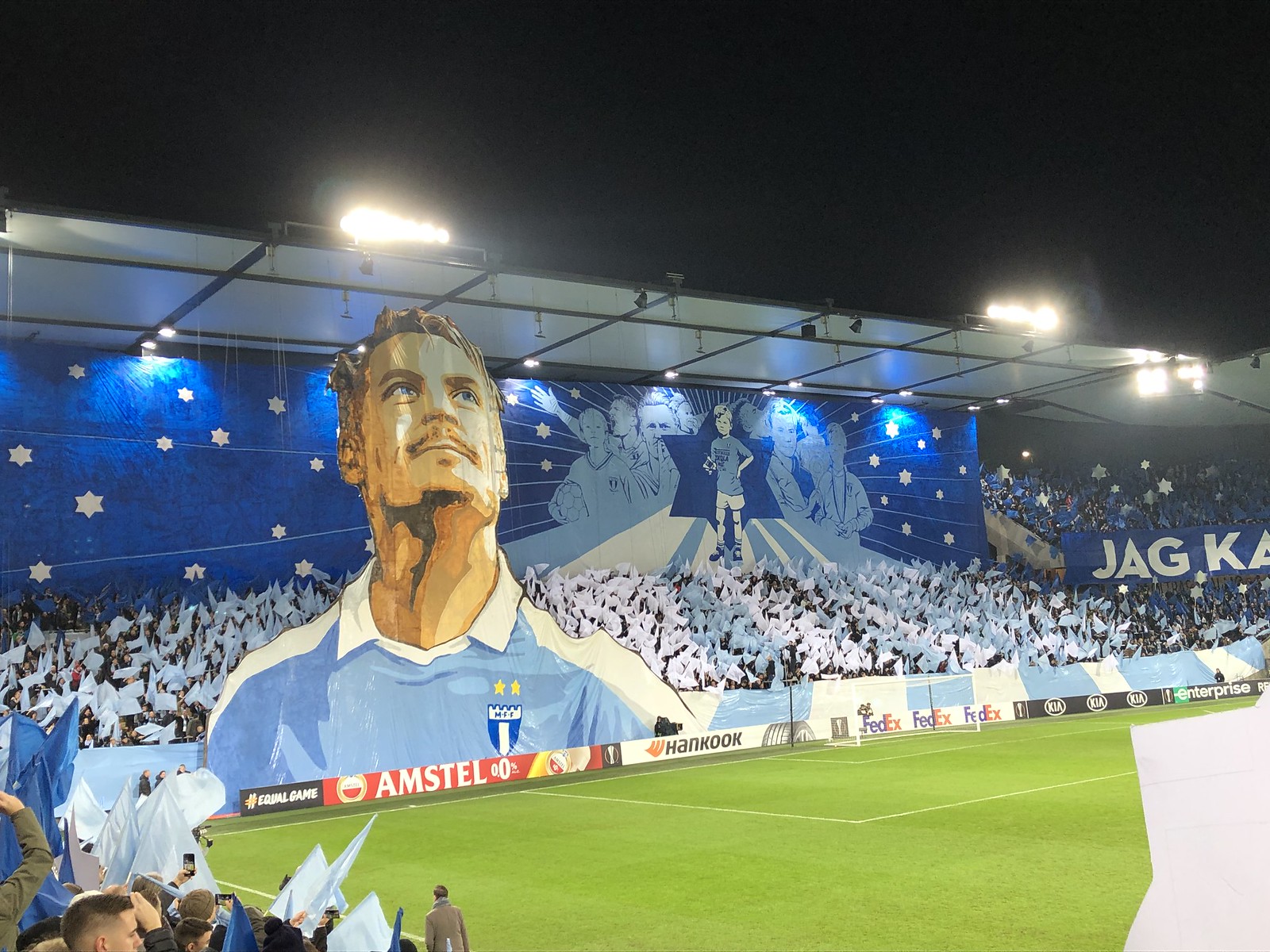
For the 2019 season, Rosenberg continued in his role as a first-team player and captain. He scored his first goal of the season on 14 April 2019, also assisting the club's first goal in a 2-0 win against Östersunds. A week later, on 22 April 2019, Rosenberg scored his second goal of the season in a 4-1 victory over Hammarby. He then scored two consecutive braces between 5 May and 12 May 2019, contributing to wins against Falkenbergs and Elfsborg. On 30 June 2019, Rosenberg officially announced his decision to retire from professional football at the end of the 2019 season.
Following his retirement announcement, he scored a hat-trick and assisted Malmö's sixth goal in a commanding 7-0 win against Ballymena United in the first leg of the UEFA Europa League first round. Rosenberg again played a crucial role in helping Malmö FF advance past the 2019-20 UEFA Europa League group stages, scoring two more goals in the play-off round. Shortly after the club's qualification for the group stage, he scored twice in a 5-0 win against Kalmar. Rosenberg later added two more goals in the subsequent two months. In the final league game of the season against Örebro, he scored twice in a 5-0 victory; Malmö FF finished second in the league, trailing champions Djurgården by just one point. In his last ever home game for Malmö FF, Rosenberg scored two goals in a thrilling 4-3 Europa League win against Dynamo Kyiv, including the game-winning goal in the 96th minute. Prior to this match, he was honored with a lap of honor, attended by his former teammates and managers, at the Stadion. As a testament to his significant contributions, dedication, and commitment to Malmö FF, Rosenberg had his bronze shoes placed at the stadium. He concluded the 2019 season with 42 appearances and 21 goals in all competitions.
3. International Career
Markus Rosenberg's international career saw him represent Sweden at various youth levels before becoming a key player for the senior national team in major tournaments.
3.1. Sweden U21
In February 2002, Rosenberg received his first call-up to the Sweden U21 squad. He made his debut on 13 February 2002, coming on as a second-half substitute in a 3-0 loss against Greece U21. Two years later, Rosenberg was selected for the Sweden U21 squad to compete in the 2004 UEFA European Under-21 Championship in Germany. He scored his first goals of the tournament in a 3-1 win against Switzerland U21 on 2 June 2004. In the semi-finals against Serbia and Montenegro U21, Rosenberg was one of five Swedish players to successfully convert their penalty in the shootout, though Sweden ultimately lost 6-5 on penalties following a 1-1 draw after extra time. Three days later, in the semi-finals against Portugal U21, he scored Sweden's second goal, but the team lost 3-2 after extra time, finishing fourth in the tournament. Overall, Rosenberg made nine appearances and scored three goals for the Sweden U21 side.
3.2. Senior National Team
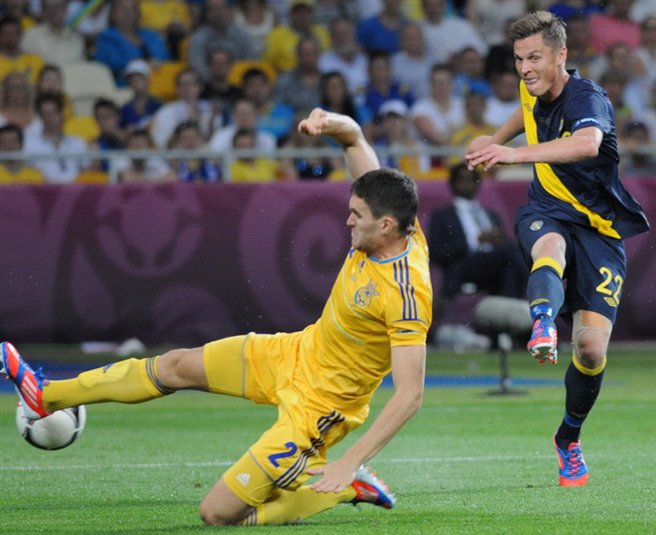
In December 2004, Markus Rosenberg received his first call-up to the Sweden national team. He made his senior international debut against South Korea on 22 January 2005. Later that year, he scored two more international goals for Sweden.
On 9 May 2006, Rosenberg was selected for the Sweden squad for the 2006 FIFA World Cup. Despite his inclusion, he remained on the substitute bench and did not play in any matches during the tournament. Sweden was eventually knocked out in the round of 16 by Germany. Despite his lack of playing time at the World Cup, Rosenberg scored his fourth international goal in a 3-1 win against Liechtenstein on 6 September 2006.
During the Euro 2008 qualifier against Denmark, Rosenberg was punched in the stomach by Christian Poulsen. This incident led to a penalty kick for Sweden and a Danish supporter attacking the referee, causing the match to be abandoned. UEFA subsequently awarded Sweden a default victory. Four days after the incident, Rosenberg scored and assisted Sweden's fifth goal in a 5-0 win against Iceland. Three months later, on 12 September 2007, he scored his sixth international goal in a 2-1 win against Montenegro. After Sweden qualified for UEFA Euro 2008, Rosenberg was included in the squad in May 2008. He made two appearances in the tournament, where Sweden was eliminated in the group stage, and his performance drew some criticism. Over the next two years, he made six more international appearances for Sweden.
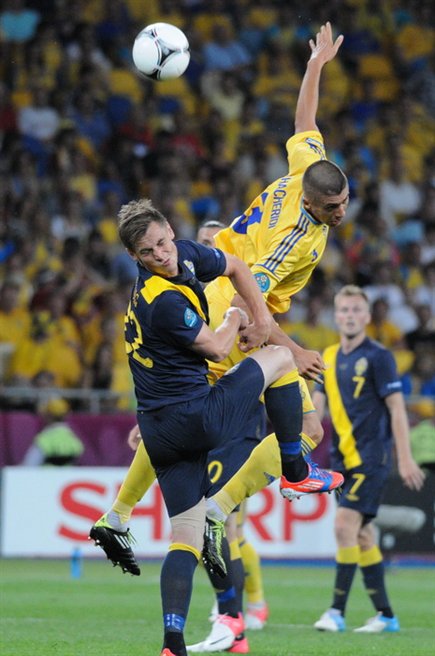
After a two-year absence from the national squad, Rosenberg was recalled in March 2011, appearing as an unused substitute against Moldova on 29 March 2011. In May 2012, he was named to the Euro 2012 squad. Prior to the tournament, Rosenberg made his first appearance for Sweden in three years, starting and playing 45 minutes in a 3-2 win against Iceland on 30 May 2012. He subsequently made two appearances in the tournament, where Sweden was once again eliminated in the group stage. Following Euro 2012, Rosenberg lost his place in the national team. After a highly successful club season in 2014, he was again considered by Sweden head coach Erik Hamrén, but Rosenberg chose to declare his retirement from international football in August 2014 to fully concentrate on his club career at Malmö FF. In total, Markus Rosenberg made 33 appearances and scored six goals for Sweden before retiring from international duty.
4. Post-playing Career
After retiring from professional football, Markus Rosenberg transitioned into new ventures within the sports industry.
Shortly after announcing his retirement, Rosenberg pursued a new career path as a football agent, collaborating with former teammate Behrang Safari. In 2018, prior to his retirement, Rosenberg also established and opened "Padelcourt No 9", a padel center located in the Swedish town of Höllviken.
5. Personal Life and Assessment
Markus Rosenberg's personal life reflects his deep roots in Malmö, while his professional career has garnered significant accolades and some critical analysis.
5.1. Personal Life
Markus Rosenberg was born and raised in Malmö, Sweden. He is married to Maria, and together they have two children. During his professional playing career, his agent was Martin Dahlin.
5.2. Legacy and Accolades
Markus Rosenberg's career, particularly his impactful second stint at Malmö FF, has cemented his status as a legendary figure for the club. In 2019, he was honored with the "Andreas Nilsson Memorial Award" for his many years of unwavering commitment as a player and captain at Malmö FF. His significant contributions and symbolic status were further recognized when he was named the club's greatest footballer of the 21st century. Following his final home game for Malmö FF, his bronze shoes were prominently placed at the Stadion as a permanent tribute to his dedication and achievements. His leadership qualities and positive influence on the teams he played for, especially Malmö FF, are widely acknowledged.
5.3. Criticisms and Controversies
Throughout his career, Markus Rosenberg, like many professional athletes, faced performance-related criticisms and disciplinary actions. Early in his career at Malmö FF, he struggled to secure a consistent first-team spot due to intense competition and injury issues. During his time at Ajax, his performance levels notably dipped in the middle of the 2005-06 season, leading to managerial criticism and a change in his playing position. At Werder Bremen, his goal-scoring form also came under scrutiny, particularly after his prolific first two seasons. His public expression of frustration to the German tabloid Bild in 2010 regarding his limited playing time sparked some controversy. On the disciplinary front, Rosenberg received a red card for two yellow cards during his loan spell at Racing Santander in 2010. He was also sent off for an unprofessional foul against BK Häcken in May 2016 and received a straight red card for a similar foul against Djurgården in August 2017, leading to suspensions that impacted his availability for Malmö FF.
6. Honours
Ajax
- KNVB Cup: 2005-06
- Johan Cruyff Shield: 2006
Werder Bremen
- DFB-Pokal: 2008-09
Malmö FF
- Allsvenskan: 2014, 2016, 2017
- Svenska Supercupen: 2014
Individual
- Allsvenskan Top goalscorer: 2004
- Allsvenskan Forward of the Year: 2014
- Allsvenskan Player of the Year: 2014
- Allsvenskan Top assist provider: 2014
7. Career Statistics
Detailed statistical data showcasing Markus Rosenberg's club and national team appearances and goals throughout his career.
7.1. Club
| Club | Season | League | Cup | Continental | Total | |||||
|---|---|---|---|---|---|---|---|---|---|---|
| Division | Apps | Goals | Apps | Goals | Apps | Goals | Apps | Goals | ||
| Malmö FF | 2001 | Allsvenskan | 13 | 1 | 0 | 0 | - | 13 | 1 | |
| 2002 | Allsvenskan | 11 | 0 | 2 | 0 | - | 13 | 0 | ||
| 2003 | Allsvenskan | 16 | 3 | 3 | 2 | 2 | 0 | 21 | 5 | |
| 2005 | Allsvenskan | 12 | 4 | 1 | 1 | 0 | 0 | 13 | 5 | |
| Total | 52 | 8 | 6 | 3 | 2 | 0 | 60 | 11 | ||
| Halmstads BK (loan) | 2004 | Allsvenskan | 26 | 14 | 3 | 3 | - | 29 | 17 | |
| Ajax | 2005-06 | Eredivisie | 31 | 12 | 0 | 0 | 8 | 2 | 39 | 14 |
| 2006-07 | Eredivisie | 9 | 0 | 0 | 0 | 5 | 3 | 14 | 3 | |
| Total | 40 | 12 | 0 | 0 | 13 | 5 | 53 | 17 | ||
| Werder Bremen | 2006-07 | Bundesliga | 14 | 8 | 0 | 0 | - | 14 | 8 | |
| 2007-08 | Bundesliga | 30 | 14 | 3 | 1 | 11 | 1 | 44 | 16 | |
| 2008-09 | Bundesliga | 29 | 7 | 5 | 5 | 13 | 1 | 47 | 13 | |
| 2009-10 | Bundesliga | 17 | 1 | 1 | 0 | 6 | 3 | 24 | 4 | |
| 2010-11 | Bundesliga | 0 | 0 | 0 | 0 | 1 | 1 | 1 | 1 | |
| 2011-12 | Bundesliga | 33 | 10 | 1 | 1 | - | 34 | 11 | ||
| Total | 123 | 40 | 10 | 7 | 31 | 6 | 164 | 53 | ||
| Werder Bremen II | 2006-07 | Regionalliga | 2 | 0 | - | - | 2 | 0 | ||
| Racing Santander (loan) | 2010-11 | La Liga | 33 | 9 | 2 | 0 | - | 35 | 9 | |
| West Bromwich Albion | 2012-13 | Premier League | 24 | 0 | 3 | 0 | - | 27 | 0 | |
| 2013-14 | Premier League | 4 | 0 | 2 | 0 | - | 6 | 0 | ||
| Total | 28 | 0 | 5 | 0 | 0 | 0 | 33 | 0 | ||
| Malmö FF | 2014 | Allsvenskan | 28 | 15 | 4 | 2 | 12 | 7 | 44 | 24 |
| 2015 | Allsvenskan | 28 | 11 | 4 | 2 | 10 | 3 | 42 | 16 | |
| 2016 | Allsvenskan | 22 | 8 | 6 | 3 | - | 28 | 11 | ||
| 2017 | Allsvenskan | 24 | 7 | 0 | 0 | 1 | 1 | 25 | 8 | |
| 2018 | Allsvenskan | 27 | 13 | 6 | 2 | 13 | 4 | 46 | 19 | |
| 2019 | Allsvenskan | 27 | 13 | 1 | 0 | 12 | 8 | 41 | 21 | |
| Total | 156 | 67 | 21 | 9 | 48 | 23 | 225 | 99 | ||
| Career total | 460 | 150 | 47 | 22 | 94 | 34 | 601 | 206 | ||
7.2. International
| National team | Year | Apps | Goals |
|---|---|---|---|
| Sweden | 2005 | 6 | 3 |
| 2006 | 6 | 1 | |
| 2007 | 7 | 2 | |
| 2008 | 7 | 0 | |
| 2009 | 4 | 0 | |
| 2010 | 0 | 0 | |
| 2011 | 0 | 0 | |
| 2012 | 3 | 0 | |
| Total | 33 | 6 | |
7.2.1. International goals
A detailed list of goals scored by Rosenberg for the Swedish senior national team.
| # | Date | Venue | Opponent | Score | Result | Competition |
|---|---|---|---|---|---|---|
| 1 | 22 January 2005 | The Home Depot Center, Carson, United States | South Korea | 1-1 | 1-1 | Friendly |
| 2 | 17 August 2005 | Ullevi, Gothenburg, Sweden | Czech Republic | 2-1 | 2-1 | Friendly |
| 3 | 12 November 2005 | Seoul World Cup Stadium, Seoul, South Korea | South Korea | 2-2 | 2-2 | Friendly |
| 4 | 6 September 2006 | Ullevi, Gothenburg, Sweden | Liechtenstein | 3-1 | 3-1 | UEFA Euro 2008 qualification |
| 5 | 6 June 2007 | Råsunda Stadium, Solna, Sweden | Iceland | 4-0 | 5-0 | UEFA Euro 2008 qualification |
| 6 | 12 September 2007 | Podgorica City Stadium, Podgorica, Montenegro | Montenegro | 1-1 | 2-1 | Friendly |